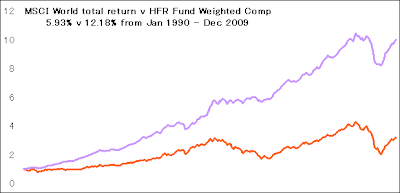Hedge funds provide vast benefits to society. Foundations 100% invested in alternatives have more capital to give to charitable causes. Pensions mostly invested in proper hedge funds have better funded liabilities so avoid benefit reductions, raised retirement ages and higher sponsor contributions. University endowments fully allocated to absolute return gain more for student scholarships and faculty salaries. Wealthy families and ultra high net worth individuals give more to philanthropy.
Good hedge fund managers are underpaid considering the value they provide. Thanks to the superb returns delivered by skilled managers, investors large and small are able to achieve goals without exposing savings to the absurdly volatile stock market. Why risk money on unskilled stock and bond benchmarks? The value, functionality and consistency of performance makes hedge funds CHEAPER than passive investments on a long term value comparison. Chalkboard = index fund; Apple iPad = hedge fund.
Fiduciaries are required to ensure money is managed prudently. Index funds are obviously NOT prudent since they neglect to research securities nor attempt to hedge or even manage risk. Some investors take their chances with “low fee”, high cost unskilled funds that do no security analysis or due diligence. Smart investors invest in skill strategies because AFTER FEE risk-adjusted returns are so much higher.
I’m a value investor and very conservative. I started by purchasing emerging and frontier market debt, equity and real estate far cheaper that its intrinsic worth. Also I spent many years buying deeply mispriced options, derivatives and hybrid securities in those “unpredictable” and “efficient” markets fantasized about by “Nobel” prize tenured(!) economists. Recently I’ve been helping clients construct portfolios of strategies run by managers whose fees are a bargain compared to their VALUE. The higher hedge fund pay, the more investors make.
Incentives work. We can be thankful REAL hedge funds exist to provide alpha when traditional investments don’t. 2 and 20 incentivizes top managers to accept outside capital and build an institutional infrastructure when they could simply choose to just manage family and friend money. If you want to be sure of a secure retirement avoid long only stocks and bonds and focus on diversified absolute return strategies. Hedge fund salaries align the interests of clients with managers and reflect the enormous demand for and limited supply of true financial acumen.
Investors can choose old products or more powerful performance. Individual investors ALLOWED to invest in good hedge funds retire earlier and wealthier. Make clients billions and receive $1 billion for doing so is a win/win deal. Hedge funds provide deeper liquidity and act as a buyer of last resort thereby REDUCING market volatility. Making money in a recession is when alpha is needed most and what clients hired managers to do.
Those notorious “wages” mostly go to hedge fund charity. Hedge fund pay is a kurtotic variable where fat tails render means meaningless. Rich lists miscalculate “income” and customers ultimately sign all “paychecks”. Those delivering absolute returns deserve a share for making and saving clients far more. Funds below high water marks aren’t paid well in drawdowns as the 20% incentive fee only applies to new profits. Necessity is the mother of invention and we need INNOVATIVE alpha sources and lower risk portfolios.
Successful hedge fund managers are entrepreneurs with an essential service in high demand. No matter how long a firm has been in existence I regard hedge fund investing as similar to venture capital. Angels that stake other private business get just 25%, and often less, of gross returns whereas investors in hedge funds receive 75% of gains. Managers retain the balance for sweat equity, 100 hour work weeks and low pay when underwater. Hedge funds make their talents and technologies available for a very competitive price. The value proposition is over three times better and with considerably less risk.
Positive numbers in 2008 and 2009 is impressive and over 1,000 managers did just that. “Aggregate” hedge fund returns are routinely cited but not AVERAGE hedge fund pay. In finance the average can confuse and disguise risk. Some CDO structurers mixed 700 FICO with 400 FICO scores for “average” default rates and a few managers figured out the dangerous result years beforehand. Some good hedge funds that lost money in 2008 worked nearly gratis last year with the 2% going to employee and infrastructure costs. Much “pay” was capital gains on own cash: shared upside AND downside aligned with investors.
Hedge fund managers able to deliver persistent returns could avoid many hassles by only trading personal, family and friend money. To use up capacity and endure the due diligence and monitoring to accept outside OPM cash it should be financially worthwhile. Many good hedge fund managers like Michael Burry close due to success and before reaching billionaire status. Reverse survivorship bias? Why do so many assume that a hedge fund that ceases to exist must have blown up? Are two of the best shows on TV, 24 and Lost, “failures” because they are also shutting down?
An unbiased qualitative and quantitative analysis of the FACTS shows that absolute alpha is a bargain. I prefer managers to make billions since investors will receive many more billions under that payoff scenario. Hedge funds don’t exclusively trade for the superrich; they manage money or soon will be for most retirement plans and eventually a majority of individual investors of every net worth. Few on the rich list spend much time on static asset allocation. They focus on security selection, tactical timing and, most important, value creation for clients.
In other industries “change in net worth” is not “salary”. David Tepper, manager of Appaloosa, apparently received the highest “paycheck” of $4 billion, followed by George Soros at $3.3 billion, James Simons on $2.5 billion and John Paulson with $2.3 billion. They and their teams produced a lot of alpha and rightly received compensation for skill and shared capital alignment with investors. Given the anomalies and inefficiencies created by forced selling in late 2008, I wrote it was obvious 2009 would be an excellent year for alpha just like deleveraging in late 1998 and negative sentiment on hedge funds led to a great 1999. The hot money panicked but sophisticated investors saw the opportunity.
I am typing this post on my newly acquired Apple iPad. That might help Steve Jobs be “paid” more billions but, like absolute return, the product is tangibly useful and fills a need. Similar to proper hedge fund managers, the Apple AAPL people deliver performance that most want so they get paid well. The Masters golf championship is being held today where someone will receive a lot of money for the best putting skill. Putt for dough and perform for dough since investment skill is much more valuable. Unskilled golfers don’t play at the Masters and unskilled fund managers don’t work at GOOD hedge funds. But hedge fund databases list thousands of hedge funds that aren’t good, dragging down “aggregate” returns. Can you imagine the typical score at the Masters if every “golfer” played? 100+?
Performance net to clients is what matters. Wisdom surpasses wealth and fees for expert knowledge are more than justified. 20 years is a long time applicable to most investors. Below is the total return of the MSCI World versus hedge fund benchmark, the HFR Fund Weighted Composite. Clearly consistent outperformance net of all fees and the difference will be just as wide in 2010-2030. Considering the 80/20 Pareto rule of thumb I use that 80% of hedge funds do not generate alpha, investors with robust portfolio structuring and manager due diligence processes have done better and will continue to do so. Expertise exists at many levels and has great value.


